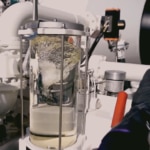BBVA Joins Iberia Initiative to Reduce Carbon Footprint of Corporate Flights
BBVA is the first financial institution to join Iberia’s Círculo SAF, a community dedicated to supporting the development of the sustainable aviation fuel (SAF) industry and promoting lower emissions into the atmosphere.

This alliance, which also includes Telefónica, Repsol and Amadeus, facilitates greenhouse gas emission reduction through the use of sustainable fuel on certain Iberia corporate and cargo flights.
According to the International Air Transport Association (IATA), sustainable aviation fuel accounted for 0.3 percent of global airplane fuel production in 2024. By 2050, the IATA estimates that nearly 500 billion liters will need to be produced to reach the net-zero emission target. Through collaborative efforts, Iberia’s Círculo SAF aims to support the energy transition by promoting the development of SAF. Círculo companies purchase an amount equivalent to a set percentage of the carbon footprint generated by certain corporate and cargo flights operated by Iberia. This contributes to global emission reductions for the aviation industry, while allowing member companies to reduce part of their Scope 3 emissions.
As a member of this initiative, BBVA will be able to reduce emissions from its corporate flights on Iberia by 30 percent, within Scope 3, Category 6, which refers to emissions associated with employees’ business travel¹.
“Becoming a member of Iberia’s Círculo SAF means taking another step further in managing our carbon footprint, while supporting the aviation sector’s decarbonization efforts. A sector we included in our decarbonization targets in 2023, and one that requires both the development of cleantech and the participation of companies and governments to promote the use of sustainable aviation fuel,” said Leonardo Pereyra, Head of Direct Impact in the Sustainability Area at BBVA. He also stressed the importance of alliances of this kind “to propel the energy transition.”
Participating companies receive certification for the SAF used on Iberia flights. The SAF is certified according to the sustainability criteria established by the European Renewable Energy Directive (RED II).

Specifically, the sustainable aviation fuel Iberia uses to reduce the carbon footprint of Círculo SAF members comes from organic waste, such as used cooking oil. Emission reductions are calculated based on actual fuel consumption data for 2023, differentiated by route, type of aircraft and cabin type for flights operated in 2023. From there, the carbon dioxide equivalent conversion factor defined by the U.K. Department for Environment, Food & Rural Affairs (DEFRA) is applied, along with the percentage reduction in emissions achieved by using SAF compared with conventional fuel.
Benefits of using SAF
Sustainable aviation fuel – currently the only viable alternative and solution to reduce part of the aviation sector’s emissions, together with fleet renewal – can be produced from agricultural or forestry waste in its biological form (bioSAF), or from renewable hydrogen and carbon dioxide (CO2) captured from the air (synthetic SAF or e-SAF), or from industrial processes (recycled carbon fuels).
According to the European Union Aviation Safety Agency (EASA), SAF is expected to reduce greenhouse gas emissions by around 80 percent on a life-cycle basis (including everything from extraction or cultivation of raw materials to combustion in flight) compared with conventional kerosene.
BioSAF, which is produced from plant-based waste, also strengthens the energy transition and the circular economy. The waste used as raw materials for its production currently largely ends up in landfills, or is discarded on farms. Therefore, developing the SAF industry would improve waste management and turn it into a resource. Socially, it can boost job creation in agricultural areas where organic waste is collected to produce this fuel, helping to combat rural depopulation and contributing to prosperity in these regions. Another benefit of SAF is that it can be used without having to alter aircraft engines or airport infrastructure.